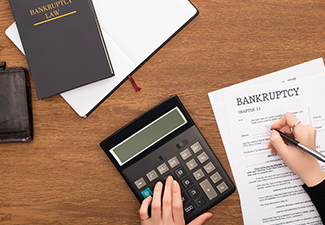When Is Filing Bankruptcy a Good Option?
Sept. 1, 2023
 When you’re burdened with bills and debts, filing for bankruptcy can be a path forward for you and your loved ones. However, understanding when bankruptcy is a good option—including understanding the eligibility requirements for bankruptcy and the debts that can be discharged— is imperative. In order to make informed decisions about your financial situation, you need to know the facts.
When you’re burdened with bills and debts, filing for bankruptcy can be a path forward for you and your loved ones. However, understanding when bankruptcy is a good option—including understanding the eligibility requirements for bankruptcy and the debts that can be discharged— is imperative. In order to make informed decisions about your financial situation, you need to know the facts.
If you're considering filing for bankruptcy, reach out to a Colorado bankruptcy attorney. At Kinnaird Law Firm, we are ready to guide clients in bankruptcy-related matters. Our attorneys will strive to understand your unique financial situation and explore your possible debt relief options. We can help determine whether bankruptcy is right for you, and if so, help you prepare for bankruptcy properly and guide you through the filing process.
Our firm proudly serves clients across Colorado Springs, El Paso County, Douglas County, and the rest of Colorado.
Assess Your Current Financial Situation
When exploring your debt relief options, it is important to evaluate your current financial situation to determine if bankruptcy is a good option. Here are some crucial elements to consider:
The Amount of Debt You Owe
Calculate your debt-to-income (DTI) ratio to know what percentage of your income goes into servicing your debts. A debt load of 50% or more indicates a significant debt burden and may result in financial difficulties. If you find yourself in such a situation, you should consult with a bankruptcy lawyer to understand your financial relief options.
Money Coming In vs. What is Owed
Compare what you earn with what you owe. For individuals who earn a decent income but can't account for their spending, you may need to monitor your expenses and make some lifestyle changes. Create a strategic financial plan or budget that makes you save more and spend less. With this, you will have enough disposable income to settle your outstanding debts gradually.
Are Debt Collectors Calling?
If you're receiving endless text messages, phone calls, emails, and demand letters from creditors and debt collectors, you should consider bankruptcy. When you file your bankruptcy petition, an "automatic stay" order will be activated. This court injunction will help stop further collection efforts, ongoing legal actions, creditor calls, and harassment.
What Bankruptcy Chapter Are You Eligible for?
It’s important to examine your present financial status to decide the ideal bankruptcy chapter for you. If you have numerous unsecured debts, such as credit card and medical debts, filing for Chapter 7 may help wipe out most of these forms of debt. In contrast, if you earn a reasonable income, you may be able to settle your unpaid debts with your future earnings through a Chapter 13 repayment plan.
Understand Your Bankruptcy Options
Chapter 7 and Chapter 13 are among the most common bankruptcy options for individuals, families, and business owners in Colorado. Here's a brief overview:
Chapter 7 Bankruptcy
Chapter 7 bankruptcy can help wipe out most of your general unsecured debts and offer you a financial fresh start. In Chapter 7, the Colorado court will appoint a trustee to oversee your case. The bankruptcy trustee will gather and sell your non-exempt assets and use the net proceeds to pay back some or all of your creditors. At the end of your case, your unsecured debts, such as credit card debts, personal loans, and medical debts, will be discharged.
Chapter 13 Bankruptcy
Chapter 13 bankruptcy is available to regular income earners who are overwhelmed with bills and debts. In Chapter 13, the debtor will propose a feasible repayment plan—structured over 3 to 5 years—to settle their debts using their potential income. In addition, Chapter 13 allows you to keep most or all of your assets. At the end of your repayment plan period, your non-priority unsecured debts, including credit card bills, personal loans, and other unpaid balances, will be discharged.
Which Debts Won't Be Forgiven?
Not all your debts will be forgiven or wiped out when you file for bankruptcy. Here are some debts that bankruptcy typically won't eliminate:
Divorce settlement debts
Tax debts
Fraudulent debts
Spousal support or alimony
Child support
Student loans
Criminal restitution
Fines and penalties
Regardless of the bankruptcy chapter you're filing for, you would still need to pay back these debts. A results-oriented bankruptcy lawyer can fully explain how bankruptcy affects your assets and help you understand the debts you need to settle.
Identifying Which Assets Could Be Affected
While filing for bankruptcy won't leave you with absolutely nothing, here's how it might affect some of your assets:
Your Home
Filing for bankruptcy will eliminate some of your general unsecured debts. With this, it will be easier to pay back your home loan. Moreover, the Colorado homestead exemption helps protect between $250,000 and $350,000 in your home equity. Thus, you can most likely keep your home in bankruptcy, provided that you do not default on your mortgage payments.
Your Vehicle
In Colorado, you may be eligible to exempt up to $7,500 of your motor vehicle equity ($12,500 for elderly or disabled persons) when filing for bankruptcy. Keep in mind that the creditor can repossess your vehicle if used as collateral for a loan.
Your Pension
Generally, bankruptcy can help protect your ERISA-qualified retirement accounts, life insurance policies, and pension plans. Your nest egg is fully protected in bankruptcy, and you don't need to withdraw from the retirement account to repay your debts.
Highly Experienced Legal Counsel: Kinnaird Law Firm
Filing for bankruptcy in Colorado can involve a lot of complex procedures. At Kinnaird Law Firm, we're dedicated to guiding clients in matters of debt relief and bankruptcy. As your attorneys, we can evaluate your financial situation, educate you about your available bankruptcy options, and determine the ideal chapter for you. Ultimately, we’re here to help you move forward.
Contact us at Kinnaird Law Firm today to schedule a simple case assessment. Our dedicated attorneys can offer you the detailed advocacy and legal guidance you need to make informed decisions in your bankruptcy case. We're proud to serve clients across Colorado Springs, Colorado, as well as El Paso County and Douglas County.
